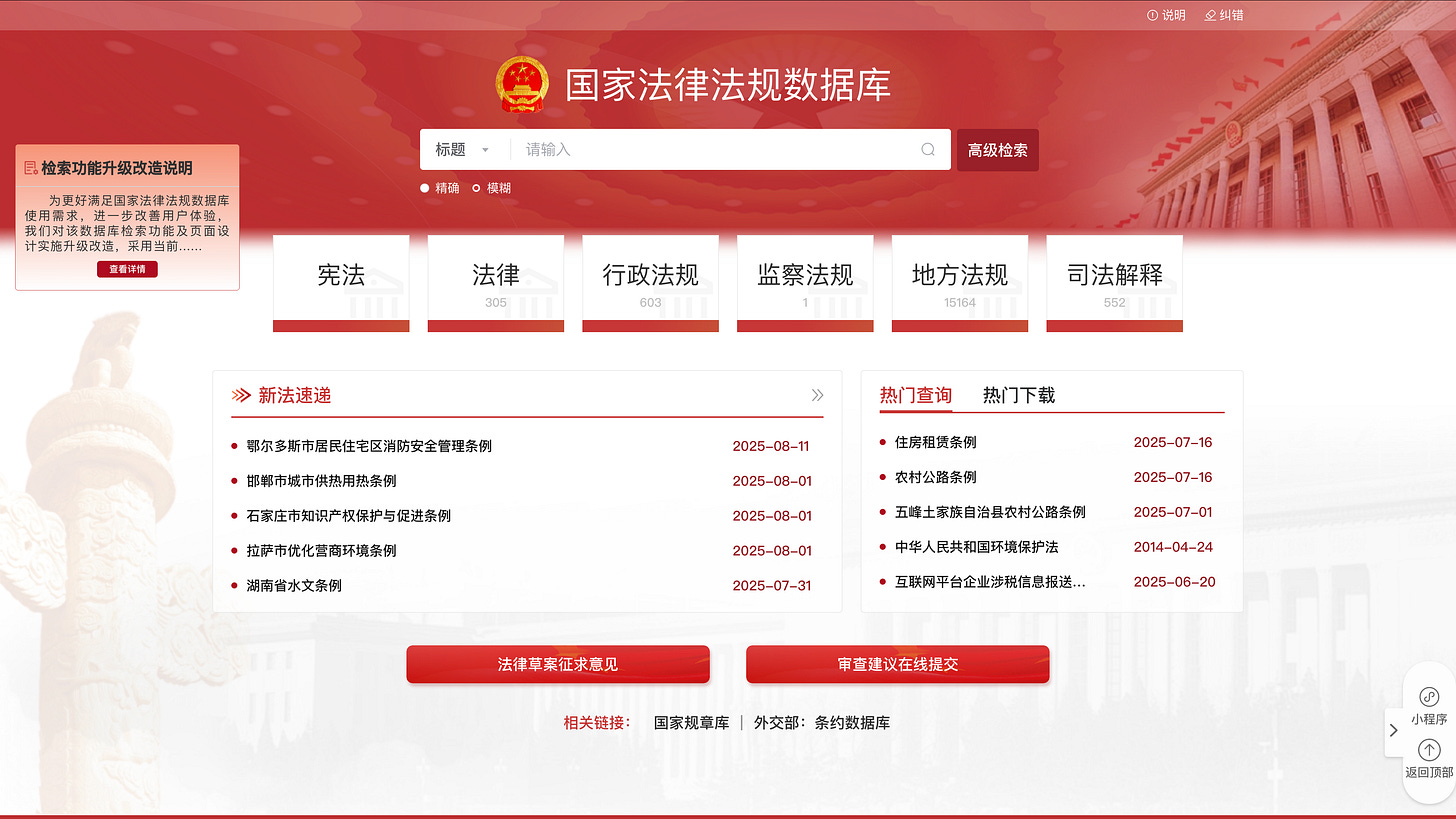June–August 2025: "Recording and Review" Guiding Cases on Fairer Regulatory Practices
Revised law of public security offenses, amended rules for grassroots legislative outreach offices, major upgrades to official Chinese law database, and other news from the summer.
Welcome back to NPC Observer Monthly, a (typically) monthly newsletter about China’s national legislature: the National People’s Congress (NPC) and its Standing Committee (NPCSC).
I’ve previously announced that I’d publish a double issue for June and July. As it turned out, there wasn’t much news from August, either, as the NPCSC postponed its typical August session to September for the second year in a row. So here we are—a rare triple issue. Going forward, monthly recaps should again become the norm.
Today, I’ll first provide a roundup of NPC-related developments from the last three months, and then end with a bit of NPC trivia.
If you’re enjoying the newsletter, I hope you’ll share it widely. —Changhao
News of the Summer
June 2025
On June 1, the Preschool Education Law [学前教育法] (adopted on Nov. 8, 2024) and the amendment to the Supervision Law [监察法] (adopted on Dec. 25, 2024) took effect.
On June 24–27, the 14th NPCSC met for its sixteenth session, which the Council of Chairpersons convened on June 16. During the session, the NPCSC reviewed twelve bills and approved two of them.
First, it revised the Anti–Unfair Competition Law [反不正当竞争法], effective October 15, 2025. There are many commentaries on the revisions out there, so I won’t produce my own. Check out, for example, this comprehensive summary and analysis by China Briefing. (Note, however, that two sections of the article—“Expanded trade secret protections” and “Shift in burden of proof for trade secret cases”— in fact discuss changes already made in 2019.)
Second, the NPCSC revised the Public Security Administration Punishments Law [治安管理处罚法], effective January 1, 2026. I’ve recently published a two-part analysis of this bill. The first part focuses on several broader issues that arose during the revision process—the use of administrative detention, the availability of detention hearings, and the vagueness of certain offenses—while the second part conducts a more comprehensive survey of the changes.
Finally, the NPCSC took two other actions of note:
It ratified the Convention on the Establishment of the International Organization for Mediation.
It removed Miao Hua [苗华] as a member of the PRC Central Military Commission. For suspected serious disciplinary violations, he was previously placed under investigation in November 2014 and removed as an NPC delegate in April 2025.
On June 27–July 26, the NPCSC sought public comment on the following bills:
draft Public Health Emergency Response Law [突发公共卫生事件应对法];
draft revision to the Maritime Law [海商法];
draft Law on Publicity and Education on the Rule of Law [法治宣传教育法];
draft revision to the Fisheries Law [渔业法];
draft revision to the Civil Aviation Law [民用航空法];
draft amendment to the Villagers’ Committees Organic Law [村民委员会组织法];
draft revision to the Urban Residents’ Committees Organic Law [城市居民委员会组织法];
draft Social Assistance Law [社会救助法];
draft Healthcare Security Law [医疗保障法]; and
draft amendment to the Food Safety Law [食品安全法].

July 2025
On July 1, the revised Mineral Resources Law [矿产资源法] (adopted on Nov. 8, 2024) took effect.
On July 18, the NPCSC Legislative Affairs Commission (LAC) released a batch of three “recording and review” (R&R) [备案审查] guiding cases.1 (Given this is the umpteenth time I’ve mentioned R&R on this Substack, I’ll assume some familiarity with the process. If not, however, don’t worry—start here!) All three cases had already been disclosed in the LAC’s annual R&R reports. Unlike those reports, which discuss each case in only a few sentences, the guiding cases explain in detail the legislation under review, the LAC’s conclusions and reasoning, and the procedures followed. This latest batch also, for the first time, begins each case with a new section—“审查要旨” (Key Points of Review)—that summarizes the documents at issue and the LAC’s conclusions, roughly analogous to the holding of a judicial opinion.
Here’s a quick summary of each case:
Case #1: Thirty-one jurisdictions across 11 provinces required property developers to pay a “property warranty deposit” [物业保修金]—typically set at 1%–3% of the total construction costs—to ensure they would fulfill repair obligations during the warranty period. In October 2024, the LAC carried out a target review of such requirements and rejected them on three grounds:
They conflicted with the Communist Party’s and State Council’s directives to eliminate most security deposits required of businesses;
They violated the State Council’s Regulations on Improving the Business Environment [优化营商环境条例], which prohibit collecting security deposits from businesses unless permitted by national laws or regulations; and
They no longer reflected reality, since many jurisdictions had already switched to requiring developers to purchase insurances—or ceased collecting the deposits altogether due to the burden on businesses.
Case #2: In October 2024, after another targeted review, the LAC discovered 3 local regulations (legislation enacted by local people’s congresses) and 2 local government rules that required non-local ridesharing companies to establish local branches before commencing operations. The LAC concluded that this requirement violated a 2022 joint opinion by the Party and the State Council on building a “unified national market” as well as the State Council’s Fair Competition Review Regulations [公平竞争审查条例]—both of which prohibit localities from creating market-entry barriers by requiring companies to establish local branches.
The LAC then added another reason: it also found the local-branch requirement inconsistent with a 2016 State Council policy document and ministerial rules regulating the ridesharing industry. Neither instrument mandates local branches for ridesharing companies, so local authorities cannot impose such a requirement, either, the LAC reasons. Insofar as the legislative authority of local people’s congresses is concerned, I’m not sure I’m persuaded by this second rationale. As I’ve elaborated here (in a different context), local legislatures may supplement national legislation as long as they don’t “contravene” the latter; it therefore turns their authority on its head to claim that they cannot go beyond national legislation in imposing new regulatory requirements (unless expressly or implicitly prohibited, of course).
Case #3: In 2020, an NPC delegate requested review of 5 municipal taxi regulations that required cab drivers to have a local hukou. In 2022, several scholars submitted a follow-up request targeting similar requirements imposed by 9 other cities. The LAC agreed with the petitioners that the requirement ran counter to a 2020 Party and State Council opinion vowing to “correct employment discrimination based on status [身份]”—a directive that the LAC says embodies the constitutional principle that all citizens are “equal before the law.”
The LAC reports that all nine regulations at issue in Case #3 have been amended, whereas the relevant local authorities have all agreed to correct the problems identified in the other two guiding cases.
On July 22, the LAC released amended work rules for its “grassroots legislative outreach offices” [基层立法联系点], which it had adopted on July 14. I briefly introduced those offices in this issue of the newsletter. In short, they are existing grassroots institutions—most are county-level people’s congresses—that, upon application, the LAC has designated to gather the views of local communities on legislative matters (legislative agenda, pending legislation, etc.). Each outreach office is directed to recruit personnel to proactively engage with its local community. I’ve prepared a comparison chart (in Chinese) for those interested.
The amendments reinforce the volunteer role that those offices play, making clear that they aren’t subordinate to the LAC. For example, the amended rules bar performance evaluations or rankings of the offices, so as not to add to the workload of the host institutions. They also require the LAC to consult the offices on the draft laws they wish to work on and to “fully respect” those preferences. Other notable changes include involving the offices in the LAC’s R&R work; providing for greater informatization of their workflow; and specifying the role of the LAC’s new Office of Grassroots Legislative Outreach Offices.
August 2025
On August 20, the NPC rolled out major upgrades to China’s National Database of Laws and Regulations. They gave the site a more modern look, introduced useful new features, and substantially improved core functionalities (such as search). I’m preparing a full guide and review, so stay tuned. (In the meantime, check out our lukewarm review of the original database from four-and-a-half years ago.)
On August 26, the Council of Chairpersons decided to schedule the 14th NPCSC’s next regular session for September 8–12. The session will consider 16 legislative bills and 8 oversight reports, among other business. I’ve previewed its agenda here.
In August, the NPC released the official (but non-binding) English translations of the following laws:
Law on the Delegates to the National People’s Congress and Local People’s Congresses [全国人民代表大会和地方各级人民代表大会代表法] (as amended Mar. 11, 2025) [bill page];
Cultural Relics Protection Law [文物保护法] (as revised Nov. 8, 2024) [bill page]; and
Anti–Domestic Violence Law [反家庭暴力法] (adopted Dec. 27, 2015) [bill page].
NPC Trivia: Statutory References to Administrative Regulations
The Chinese legislature is loath to amend statutes frequently. So presumably to obviate the need for technical conforming amendments, it cites other laws as a whole in statutory cross-references, without specifying particular provisions.2 For the same reason, it has stopped citing specific administrative regulations in statutes since around 2010 (except when repealing them), instead referring vaguely to the “relevant regulations” on a certain subject.
The legislature has consistently deleted references to specific administrative regulations when it revises draft laws. For example, the first draft of the pending Public Health Emergency Response Law [突发公共卫生事件应对法] would require that, during public health emergencies, medical waste be handled in accordance with the State Council’s Regulations on the Administration of Medical Waste [医疗废物管理条例], among other authorities. The latest draft now simply requires compliance with the “provisions of the relevant laws and regulations.”
I was therefore surprised to see that the revised Public Security Administration Punishments Law bucked this trend by citing a specific regulation. Article 141, paragraph 2 reads:
Where public security organs impose punishments in accordance with the PRC Firearms Control Law [枪支管理法], the Regulations on the Management of the Safety of Civilian Explosives [民用爆炸物品安全管理条例], and other laws or administrative regulations that directly relate to public security and social order, this Law applies to the punishment procedures.
This provision was in the draft submitted by the State Council. The legislature might have thought that the scope of “administrative regulations that directly relate to public security and social order”would be too vague without an example, so it probably retained the citation in the interest of procedural clarity.
As far as I can tell, only two other statutes still cite specific regulations:
a 1993 statute applying the State Council’s interim regulations on the value-added tax, consumption tax, and (now-repealed) business tax to foreign or foreign-invested enterprises, which names those regulations in full; and
the 2010 National Mobilization Law [国防动员法], which cites the Regulations on the Preferential Treatment of Military Personnel [军人抚恤优待条例].
That’s all for this triple issue. Thanks for reading!
There is no official label for this batch of cases. But I assume they would’ve been given the same label as earlier cases posted in the same section on the NPC website.
Except for the Criminal Law [刑法], the NPC has also chosen to renumber all articles in a statute after each update, making technical updates necessary were it to use precise cross-references.


